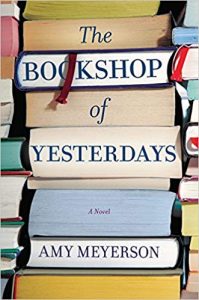FOR THE LOVE OF PEOPLE, BOOKS, HISTORY, AND ADVENTURE

A good novel delves deep into the psyches of its characters while also telling a story that’s intriguing enough to keep the reader turning pages. The Bookshop of Yesterdays by Amy Meyerson succeeds on both fronts by weaving three different types of stories about the same people into a seamless whole.
First, The Bookshop of Yesterdays is an adventure story developed through a clever scavenger hunt. For the first twelve years of her life, Miranda Brooks spends happy hours following the clues to scavenger hunts designed by her Uncle Billy. Then, after a hunt that leads Miranda to the puppy she’s always wanted but her mother refuses to let her keep, Uncle Billy disappears, and she doesn’t hear from him again until just before his death 16 years later.
The message Miranda receives is a copy of Shakespeare’s The Tempest, which arrives in the mail with no sender’s name, but with two clues that Miranda recognizes as coming from Billy. The clues compel her to return from Philadelphia, where she currently lives, to Billy’s bookshop in California, to start on this last scavenger hunt. What she doesn’t know is that the hunt will take her to physical places, but it will also take her deep into her family’s past and introduce her to people she never knew existed. As a middle-school history teacher, Miranda reveres history and its significance for present-day life, a reverence that permeates the entire novel.
One notable aspect of Meyerson’s writing is the ease with which she slips into scenes from the past and then back into the present. It’s a challenge for most writers, and she does it repeatedly and well.
Secondly, The Bookshop of Yesterdays is a love story about different kinds of relationships, especially the one between Miranda and her mother. Several days before the fiasco with the puppy, Billy misses Miranda’s birthday party and then shows up at her house at 3:00 a.m. From the top of the stairs, Miranda hears her mother yelling at Billy with anger and curse words she’s never heard from her mother before. She’s certain the problem is more than Billy’s missing the party, especially when her mother removes photos of Billy from their living room and Billy disappears. She knows Billy and her mother have always been close siblings and doesn’t understand what’s happened between them.
This incident and the rejection of the dog lead Miranda to say things to her mother that she’s never said before, the first step in the fracturing of their relationship. When she returns home to follow the clues from The Tempest, her mother refuses to accompany her to Billy’s funeral and is disturbed that Billy has left the bookshop to Miranda in his will. Again, Miranda doesn’t understand, but she begins to sense that her mother is hiding information about the family.
Although she and her mother have remained close through the years, Miranda always sensed her mother was followed by a shadow that she thought was caused by her mother’s aborted dreams of being a singer. Now she suspects it has something to do with Billy. When the clues lead Miranda to the father of Billy’s long-dead wife, her mother pleads with her not to talk to the man, which makes Miranda more determined to do it. But what bothers her most is that her mother won’t tell her what’s going on.
The third type of story weaved into The Bookshop of Yesterdays is a homage to literature. Meyerson shows great respect for the power of literature and the influence it can have on people’s lives. The first clue comes to Miranda in The Tempest, which is revealed to be a significant parallel for the story. Subsequent clues come from a variety of novels, including Jane Eyre, Alice’s Adventures in Wonderland, Frankenstein, Fear of Flying, Persuasion, The Grapes of Wrath, and Bridge to Terabithia, and in each book the clue is singularly appropriate for a particular stage of Miranda’s journey. Meyerson’s ability to find the perfect quote in each situation is impressive.
As a whole, The Bookshop of Yesterdays is intellectually challenging (just try to figure out what all the clues mean) and emotionally engaging, with characters who resonate and resolutions that are satisfying in more than one aspect. It’s the story of a family torn apart and then taking the first steps to put itself back together again.
Sally Whitney
Sally Whitney is the author of When Enemies Offend Thee and Surface and Shadow, available now from Pen-L Publishing, Amazon.com, and Barnesandnoble.com. When Enemies Offend Thee follows a sexual-assault victim who vows to get even on her own when her lack of evidence prevents police from charging the man who attacked her. Surface and Shadow is the story of a woman who risks her marriage and her husband’s career to find out what really happened in a wealthy man’s suspicious death.
Sally’s short stories have appeared in magazines and anthologies, including Best Short Stories from The Saturday Evening Post Great American Fiction Contest 2017, Main Street Rag, Kansas City Voices, Uncertain Promise, Voices from the Porch, New Lines from the Old Line State: An Anthology of Maryland Writers and Grow Old Along With Me—The Best Is Yet to Be, among others. The audio version of Grow Old Along With Me was a Grammy Award finalist in the Spoken Word or Nonmusical Album category. Sally’s stories have also been recognized as a finalist in The Ledge Fiction Competition and semi-finalists in the Syndicated Fiction Project and the Salem College National Literary Awards competition.
- Web |
- More Posts(67)